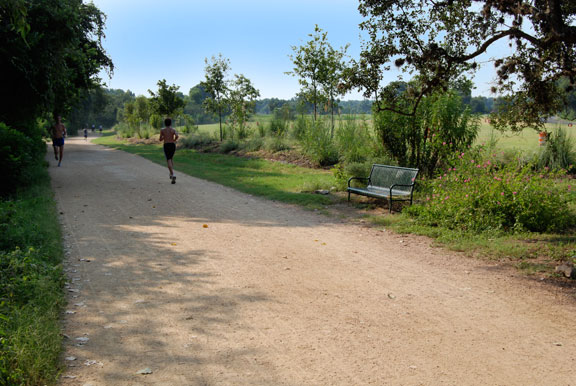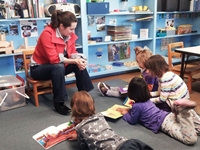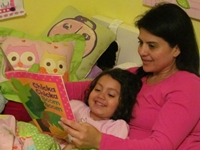Central Texans enjoy a much-touted quality of life that can be easily taken for granted. As our city grows rapidly, how can we maintain our community’s vibrancy? It’s clear that no one entity can sustain what we value so much — from our beautiful outdoor spaces and extensive academic community, to our capable and educated work force.
Partnerships are proving to hold the power to deliver a good quality of life for our growing community. Both The Trail Foundation and BookSpring have forged partnerships across economic, social and business boundaries to keep Central Texas thriving.

![]() The Trail Foundation collaborates to protect an Austin jewel
The Trail Foundation collaborates to protect an Austin jewel
The statistics are telling: As many as 15,000 people use the Ann and Roy Butler Hike and Bike Trail at Lady Bird Lake each day, and the trail receives 1.5 million visits annually. That’s a lot of wear and tear.
“There just aren’t enough City funds to take care of the trail adequately,” says Jenny McMillan, Development Director for The Trail Foundation.
The nonprofit was formed in 2003 and has spent the past decade in a close partnership with the City of Austin. That partnership with the City’s Parks and Recreation Department allows The Trail Foundation to pursue its core mission to enhance and protect the trail for everyone to enjoy.
About 500 volunteers annually work on projects large and small, McMillan says.
“Every volunteer comes out there because they love the trail and they want to give back to it,” McMillan says. “It is kind of like taking care of an old friend.”
The projects are approved in advance by the City, which owns the trail’s land and amenities. The work provides individuals, families, and community and corporate groups with a hands-on experience helping an Austin icon. Volunteer opportunities include trail improvement projects such as planting, weeding and general clean-up.
The Trail Foundation closes the gap between what the city provides and what the trail requires by making careful improvements to the trail’s infrastructure and environment. Given tight City budgets and a long list of projects to tackle, The Trail Foundation’s partnership with the City is a real world solution that produces results. The group’s work includes maintaining trailhead gathering areas and waterfront rest spots and adding restrooms and water fountains. The Johnson Creek trailhead near Austin High School recently underwent a major transformation, which thousands of people enjoy each day given that 34 percent of visitors enter at that location.
 “We are making a great place even better,” McMillan says.
“We are making a great place even better,” McMillan says.
The Trail Foundation has worked hard over the years to engage with and broaden its message to the community. The Lady Bird Johnson Adopt-a-Garden project is one successful example of this effort.
“Adopt-a-Garden is an excellent way for people to contribute to The Trail Foundation and have a little piece of the Trail that they can tend and nurture throughout the year,” McMillan says. “It’s a way to feel more connected to the Trail itself.” The Adopt-a-Garden program is now in its sixth year, with 28 gardens adopted.
The Trail Foundation’s ongoing Healthy Trees for the Trail project adds to the urban forest, promoting pollution control and air quality, and creating welcome shade and a buffer between traffic and the trail, McMillan says. “We’re protecting the trail to ensure it remains a peaceful, serene place.”
 Outdoor spaces are important to our community, says McMillan, and none more so than the trail.
Outdoor spaces are important to our community, says McMillan, and none more so than the trail.
“It is accessible to almost everyone, because it is so central. And it is a place in the heart of Austin that allows people to take a deep breath, step away from their hectic lives and reclaim a few minutes of peace and fulfillment for themselves.”
Learn More about The Trail Foundation

![]() BookSpring partners to close early literacy gap
BookSpring partners to close early literacy gap
The early literacy gap affects the entire community, says Mary Gatlin Hearon, Executive Director of BookSpring. The Austin-based nonprofit drives early learning by providing thousands of free books and literacy tools to children and families.
Access to books is key to solving the literacy challenge. BookSpring is able to deliver its programs “to where the people already are,” Hearon says, through its partnership with more than 25 community organizations, and with the help of hundreds of trained volunteers.
 Hearon says it is the schools’ job to educate children. “But learning doesn’t begin at kindergarten. We must dispel the myth that a child’s education begins in school and instead recognize that learning begins at birth and in the home.”
Hearon says it is the schools’ job to educate children. “But learning doesn’t begin at kindergarten. We must dispel the myth that a child’s education begins in school and instead recognize that learning begins at birth and in the home.”
Children who have not developed some basic literacy skills by the time they enter school are three to four times more likely to drop out in later years, Hearon says. And children who start behind stay behind.
“In Austin, 33 percent of low-income teens don’t graduate from high school,” she says.
Two of BookSpring’s largest early literacy programs are delivered in partnership with medical practitioners and the Austin Independent School District.
“We are in the two main institutions that every child in Central Texas is going to be involved in: health care and school,” Hearon says.
BookSpring’s outreach extends all the way from infancy to adulthood. For Reach Out and Read, BookSpring provides age-appropriate books to medical facilities and then helps ensure that doctors and other health care professionals encourage parents to read to their children. Each year, more than 18,000 children in the Austin area receive a book through the program.
This year, BookSpring continues its long-time partnership with AISD to bring Reading is Fundamental (RIF) into 32 elementary schools. Reading is Fundamental centers around regular events in the school libraries designed to spark the children’s interest in books and reading. After RIF events, each child selects a book to keep.
“We are really leveraging the work that AISD is doing,” Hearon says. “For the RIF events, we set the themes, provide the books, the volunteers, and train the school librarians.
 Many children have parents who grew up without books, and the BookSpring BookClub is designed to offer them extra encouragement. Last year, 189 parents at 10 schools participated in the program, which offers instructions on reading aloud to children. Each participating family receives six free books. In a survey afterward, 95 percent of respondents said they read to their children every day, up from 47 percent.
Many children have parents who grew up without books, and the BookSpring BookClub is designed to offer them extra encouragement. Last year, 189 parents at 10 schools participated in the program, which offers instructions on reading aloud to children. Each participating family receives six free books. In a survey afterward, 95 percent of respondents said they read to their children every day, up from 47 percent.
BookSpring depends on individual donations, grants and a small amount of government funding to buy the thousands of books it distributes each year. The nonprofit also collects gently used books to distribute to medical clinics, children’s shelters, libraries and other locations.
BookSpring also depends on volunteers for the success of its programs.
“Volunteers are the lynchpin of the organization,” Hearon says. “They know personally how the ability to read has led to their success in life. BookSpring provides a way to make a real difference in a child’s life that has a lasting impact. After all, if you cannot read, you cannot succeed.”





